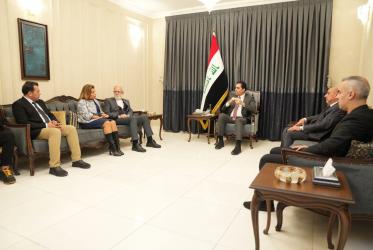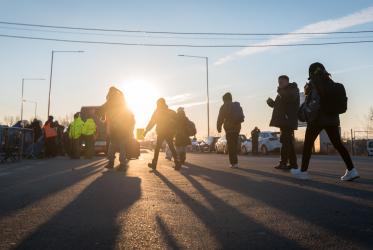The World Council of Churches is following with great concerns the tragic developments of the situation in Iraq.
We are deeply shocked and distressed by the recent events in Mosul, where hundreds of thousands of people have fled the second largest city in Iraq because of the violence and raids by the “Islamic State”, a terrorist group formerly known as the “Islamic State of Iraq and al-Sham” (ISIS). This radical group is imposing its terror on the whole population, specifically targeting minority groups, including Christians, who have remained steadfast in the city after several waves of displacement.
Out of the 500,000 people who have left Mosul and the area, there are around 10,000 Christians who have been displaced and fled to the neighbouring Kurdish areas, as well as thousands of people from other religious and ethnic minorities and many who oppose the terror regime imposed by ISIS.
Credible media reports and other accounts received from the Bishops in Mosul and the neighbouring villages in the Nineveh plain confirm that Mosul has been nearly emptied of its Christian population. Christians in this city have maintained a continuous presence since the dawn of Christianity. We also mourn with those who have lost their innocent loved ones during the military offensive, and pray for a speedy recovery for the injured.
As we have previously noted, our concern is for all people affected by the indiscriminate violence and humanitarian calamity. The WCC central committee, meeting in Geneva, Switzerland from 2-8 July, 2014 therefore:
- Encourages all the churches in Iraq and in the region who witness to the love of Christ for all their diaconal work and humanitarian assistance.
- Reiterates its call to the international community and to the specialised United Nations Agencies to ensure that all vulnerable communities in Iraq and surrounding region, and those who have found refuge in neighbouring countries receive appropriate humanitarian assistance.
- Encourages church-related agencies to redouble their efforts now, including aid for the internally displaced peoples in both Iraq and Syria, and the refugees in neighbouring countries.
- Affirms the role of the churches in Iraq and the region who are committed to engage in constructive dialogue with other religious and ethnic communities so that the pluralistic heritage of their societies is protected and secured. The WCC assures those churches of the wide ecumenical support of such a process.
- Urges the Iraqi authorities and encourages non-military international support for the initiation of an inclusive political process to strengthen fundamental human rights, in particular with regards to religious freedom, to urgently establish the rule of law and to ensure equal rights for all citizens.



